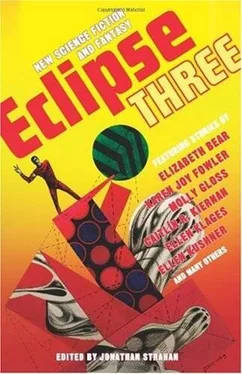Someone jostled her with his bag, and when she looked up, there was the back of that head, that smooth brown hair, so familiar, after just one night, and all her blood vessels seemed to expand at once, every cell leapt forward.
She didn't move. This was it, the last moment. This was where she could just let the crowd carry her past, carry her away, out into the night. Walk away. Go home. Use the inhaler in the fridge.
That was the sensible thing. But the Cody who had hung from the ninth-story balcony, the Cody who had risked the Atlanta contract without a second thought, that Cody thought, Fuck it, and stepped forward. Will it hurt? You could never know.
Sleight of Hand by Peter S. Beagle
She had no idea where she was going. When she needed to sleep she stopped at the first motel; when the Buick's gas gauge dropped into the red zone she filled the tank, and sometimes bought a sandwich or orange juice at the attached convenience store. Now and then during one of these stops she spoke with someone who was neither a desk clerk nor a gas-station attendant, but she forgot all such conversations within minutes, as she forgot everything but the words of the young policeman who had come to her door on a pleasant Wednesday afternoon, weeks and worlds ago. Nothing had moved in her since that point except the memory of his shakily sympathetic voice, telling her that her husband and daughter were dead: ashes in a smoking, twisted, unrecognizable ruin, because, six blocks from their home, a drowsy adolescent had mistaken his accelerator for his brake pedal.
There had been a funeral-she was present, but not there-and more police, and some lawyer; and Alan's sister managing it all, as always, and for once she was truly grateful to the interfering bitch. But that was all far away too, both the gratitude and the old detestation, made nothing by the momentary droop of a boy's eyelids. The nothing got her snugly through the days after the funeral, dealing with each of the endless phone calls, sitting down to answer every condolence card and e-mail, informing Social Security and CREF of Alan's death, going with three of his graduate students to clean out his office, and attending the memorial on campus, which was very tasteful and genuinely moving, or so the nothing was told. She was glad to hear it.
The nothing served her well until the day Alan's daughter by his first marriage came to collect a few of his possessions as keepsakes. She was a perfectly nice girl, who had always been properly courteous in an interloper's presence, and her sympathy was undoubtedly as real as good manners could make it; but when she had gone, bearing a single brown paper grocery bag of photographs and books, the nothing stepped aside for the meltdown.
Her brother-in-law calmed her, spoke rationally, soothed her out of genuine kindness and concern. But that same night, speaking to no one, empty and methodical, she had watched herself pack a small suitcase and carry it out to Alan's big old Buick in the garage, then go back into the house to leave her cell phone and charger on Alan's desk, along with a four-word note for her sister-in-law that read Out for a drive. After that she had backed the Buick into the street and headed away without another look at the house where she used to live, once upon a time.
The only reason she went north was that the first freeway on-ramp she came to pointed her in that direction. After that she did not drive straight through, because there was no through to aim for. With no destination but away, without any conscious plan except to keep moving, she left and returned to the flat ribbon of the interstate at random intervals, sometimes wandering side roads and backroads for hours, detouring to nowhere. Aimless, mindless, not even much aware of pain-that too having become part of the nothing-she slogged onward. She fell asleep quickly when she stopped, but never for long, and was usually on her way in darkness, often with the moon still high. Now and then she whistled thinly between her teeth.
The weather was warm, though there was still snow in some of the higher passes she traversed. Although she had started near the coast, that was several states ago: now only the mountains were constant. The Buick fled lightly over them, gulping fuel with abandon but cornering like a deer, very nearly operating and guiding itself. This was necessary, since only a part of her was behind the wheel; the rest was away with Alan, watching their daughter building a sandcastle, prowling a bookshop with him, reaching for his hand on a strange street, knowing without turning her head that it would be there. At times she was so busy talking to him that she was slow to switch on the headlights, even long after sunset. But the car took care of her, as she knew it would. It was Alan's car, after all.
From time to time the Buick would show a disposition to wander toward the right shoulder of the road, or drift left into the oncoming lane, and she would observe the tendency with vague, detached interest. Once she asked aloud, "Is this what you want? I'm leaving it to you-are you taking me to Alan?" But somehow, whether under her guidance or its own, the old car always righted itself, and they went on together.
The latest road began to descend, and then to flatten out into farm and orchard country, passing the occasional township, most of them overgrown crossroads. She had driven for much of the previous night, and all of today, and knew with one distant part of herself that it would soon be necessary to stop. In early twilight, less than an hour later, she came to the next town. There was a river winding through it, gray and silver in the dusk, with bridges.
Parking and registering at the first motel with a Vacancy sign, she walked three blocks to the closest restaurant, which, from the street, looked like a bar with a 1950s-style diner attached. Inside, however, it proved larger than she had expected, with slightly less than half of the booths and tables occupied. Directly to the left of the Please Wait To Be Served sign hung a poster showing a photograph of a lean, hawk-nosed man in late middle age, with white hair and thick eyebrows, wearing evening dress: tailcoat, black bowtie, top hat. He was smiling slightly and fanning a deck of playing cards between long, neat fingers. There was no name under the picture; the caption read only DINNER MAGIC. She looked at it until the young waitress came to show her to her booth.
After ordering her meal-the first she had actually sat down to since leaving home-she asked the waitress about Dinner Magic. Her own voice sounded strange in her ears, and language itself came hard and hesitantly. The girl shrugged. "He's not fulltime-just comes in now and then, does a couple of nights and gone again. Started a couple of weeks ago. Haven't exchanged two words with him. Other than my boss, I don't know anybody who has."
Turning away toward the kitchen, she added over her shoulder, "He's good, though. Stay for the show, if you can."
In fact, the Dinner Magic performance began before most of the current customers had finished eating. There was no stage, no musical flourish or formal introduction: the man in evening dress simply walked out from the kitchen onto the floor, bowed briefly to the diners, then tossed a gauzy multicolored scarf into the air. He seized it again as it fluttered down, then held it up in front of himself, hiding him from silk hat to patent-leather shoes…
… and vanished, leaving his audience too stunned to respond. The applause began a moment later, when he strolled in through the restaurant's front door.
Facing the audience once more, the magician spoke for the first time. His voice was deep and clear, with a certain engaging roughness in the lower range. "Ladies, gentlemen, Dinner Magic means exactly what it sounds like. You are not required to pay attention to me for a moment, you are free to concentrate on your coffee and pie-which is excellent, by the way, especially the lemon meringue-or on your companion, which I recommend even more than the meringue. Think of me, if you will, as the old man next door who stays up all night practicing his silly magic tricks. Because that, under this low-rent monkey suit, is exactly what I am. Now then."
Читать дальше











